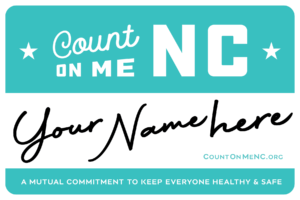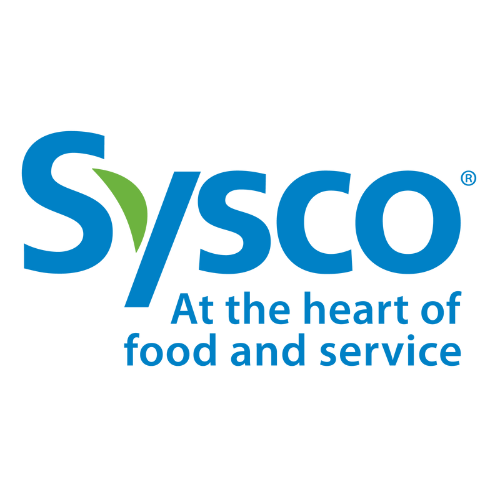
As restaurants and other businesses reopen under COVID-19’s cloud, voluntary certification program will signal commitment to high standards
The North Carolina Restaurant and Lodging Association (NCRLA) has joined forces with industry leaders, academic partners, and state officials on an innovative public health initiative for safely reopening restaurants and other businesses while addressing consumers’ need for trustworthy standards. Called Count On Me NC , the program provides specific guidance to restaurants, hotels, and other businesses on best practices on protecting guests for the phased reopening after Gov. Cooper’s COVID-19 stay-at-home order.
Count On Me NC centers on an evidence-based training program that provides specific guidance to restaurants, hotels, attractions and other businesses on best practices for North Carolina’s phased reopening after the COVID-19 stay-at-home order. A companion public relations component will encourage consumers to join the effort to keep everyone safe with a Guest Pledge . The campaign will also direct consumers to look for certificates and Count on Me NC logos for assurance that a business has completed the voluntary, no-cost training.
“Count On Me NC conveys a sense of mutual responsibility as we welcome guests back into our dining rooms and other establishments,” said Lynn Minges, NCRLA’s president and CEO. “Customers will appreciate the commitment of our restaurants, hotels and other businesses to protect their health, the health of other patrons, and the health of our employees by following the guidance of top medical experts in cleaning and sanitizing public spaces. At the same time, the presence of hand sanitizer and other cues will remind them to do their part to limit risk to their companions, fellow consumers and the people serving them.”
Count On Me NC is a public-private partnership conceived by the NCRLA Foundation and developed with the NC Department of Health and Human Services , NC State Extension and Visit North Carolina . As a leader in hospitality and education training with direct access to thousands of hospitality businesses statewide, NCRLA’s foundation is uniquely positioned to spearhead the effort to develop this collaborative partnership.
Training will be available to restaurants beginning today with courses for other businesses to follow. NCRLA asked NC State Extension to develop the training modules using its renowned team of experts in food safety training and adult education. NC State Extension responded quickly by anchoring the program on its existing system for delivering adult education online.
“The training incorporates the best available science,” said Dr. Ben Chapman, professor and food safety specialist at NC State University. “Our team combined federal agency recommendations with NC-specific guidance and supplemented with data in the peer-reviewed literature to build this foundational program. All training s and materials follow a rigorous content development and review process.”
Visit NC, which markets the state to domestic and international travelers, came on board to encourage involvement from local tourism leaders, museums, attractions, outfitters, retailers and other tourism-related businesses. Visit NC will draw on its vast network of travelers to build visitor awareness of the program.
“Research shows us that the public is eager to begin dining out and traveling,” said Wit Tuttell, director of Visit NC, a unit of the Economic Development Partnership of North Carolina. “But it also shows that they have very high expectations for cleaning and social distancing protocols.”
NCRLA and its partners will market and promote the voluntary COVID-19 training program to all the state’s restaurants, hotels, and other businesses. Those that complete the training will receive a printable certificate to display and will be able to use the Count on Me NC logo in their marketing and promotions. The logo will be supported by an advertising and social media campaign to help customers recognize these establishments as committed to the highest levels of sanitation and guest safety during COVID-19.
Count On Me NC partners will also conduct webinars for county health departments, which carry out state-mandated inspections of restaurants, hotels, and other properties. The webinars will keep health departments informed of Count On Me NC’s specific guidance and protocols for responding to the COVID-19 crisis.
Phase one of the training, outlined below, is designed for restaurant and foodservice establishments that are reopening dining rooms and other areas. Additional trainings will be subsequently released and geared for other general businesses that interact with the public such as hotels, attractions, and retailers.
- In partnership with NCRLA and health officials across the state, restaurant owners/operators will make commitments about how they are following safety requirements, recommendations for best practices and protocols during the COVID-19 crisis.
- Restaurateurs will be asked to:
-
- Encourage staff to complete the Count On Me NC training
- Print the certificate of completion and access the marketing toolkit
- Display the certificate and window decal at their restaurants
- Display the Count on Me NC logo on their website/app and link to countonmenc.org
- When customers see this endorsement, they can be certain that the restaurant is taking additional steps to protect their employees and customers and is committed to playing a leadership role in protecting our communities.
- The goal is to build confidence and trust in restaurants and foodservice establishments.
###
About NC Restaurant & Lodging Association Foundation:
The NCRLA Foundation enhances the hospitality industry’s service to the public through education, community engagement, and promotion of career opportunities. It provides relief for displaced workers through its NC Restaurant Workers Relief Fund , offers scholarships for hospitality- and tourism-based learning; supports educational programs via grants and school-to-career programs; develops and provides continuing education programs; and builds North Carolina’s hospitality workforce through career exploration and development programs, scholarships and image enhancement. www.ncrla.org
About the N.C. Department of Health and Human Services:
The N.C. Department of Health and Human Services works to advance the health, safety and well-being of all North Carolinians in collaboration with a wide array of partners and stakeholders. Within NCDHHS, the Division of Public Health promotes disease prevention, health services and health promotion programs that protect communities from communicable diseases, epidemics, and contaminated food and water. Its Environmental Health Section works to safeguard life, promote human health, and protect the environment through the practice of modern environmental health science, the use of technology, rules, public education and above all, dedication to the public trust. www.ncdhhs.gov
About NC State Extension:
NC State Extension transforms science into everyday solutions through programs and partnerships focused on agriculture and food, health and nutrition, and 4-H youth development. In response to local needs and concerns, Extension collaborates with specialists and transfers research-based knowledge and practical applications to North Carolina residents in all 100 counties. The state’s two land-grant universities, NC State University and N.C. A&T University, work in collaboration with the U.S. Department of Agriculture’s National Institute of Food and Agriculture, as well as state and local governments, to deliver local programs as part of the N.C. Cooperative Extension partnership. Extension’s efforts improve the economy and enhance residents’ quality of life. www.ces.ncsu.edu
About Visit North Carolina:
Visit North Carolina is part of the Economic Development Partnership of North Carolina, a 501(c)(3) nonprofit corporation that oversees the state’s efforts in business and job recruitment and retention, international trade, and tourism, film and sports development. The mission of Visit NC is to unify and lead the state in developing North Carolina as a major destination for leisure travel, group tours, meetings and conventions, sports events and film production. One of the state’s most vital industries, tourism generates economic activity and employment in each of the state’s 100 counties. Domestic travelers to North Carolina spent $26.7 billion in 2019 and contributed $2.16 billion in state and local tax revenues. Tourism spending creates $551 in yearly savings for the average household. VisitNC.com
###

